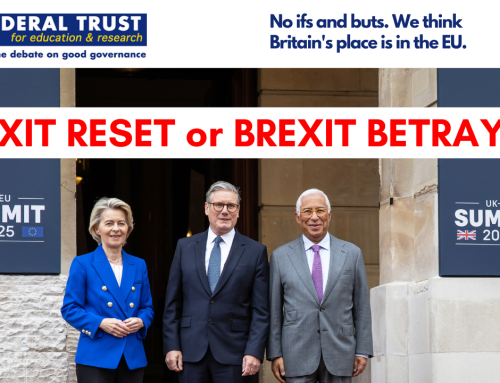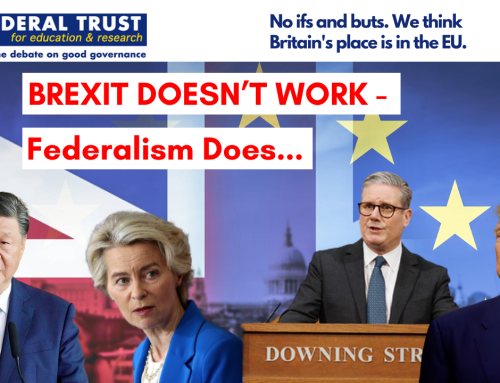
by Ira Straus
Chair, Center for War-Peace Studies
20th September 2019
The answer, in simplified form, is yes. Parliament can stop it.
The bigger question is, “Will it be stopped?” The deed is not easy and the time for it is short.
“The coup” means here, the Government’s efforts at imposition of a no-deal or nearly-no-deal Brexit over the heads of the Parliament and the people, overturning the rules of parliamentary democracy and destabilizing the union of the United Kingdom.
That is what Parliament can stop and reverse at the present time.
It is already fairly well understood that, no matter what the ruling on prorogation, there is only one sure way to do this[1]. It consists of three widely-discussed steps:
- A vote of No Confidence in the Government.
- Formation of a Government of National Unity (GNU) that represents the moderate actual majority of the Parliament and of the country.[2]
- Commitment of the GNU to a program of a second referendum, relegating any possible general election to later.
A majority in Parliament would indeed, it seems from the indications, wish to act on this program, but has been unable to organize the will to do so.
What has stood in the way of organizing its collective will? A valid concern: that it could prove counterproductive to act on Step 1, as long as Steps 2 and 3 are opposed by Mr Corbyn.
This argument, however, stands in need re-examination. Conditions have changed; other, equally valid concerns have grown stronger.
The absence of time for getting perfectly past the obstacles
The choice against voting No Confidence immediately was a tactical judgment made months ago. Time was already short back then, but far from completely lacking. There was then a PM who was willing to ask the EU for an extension of time rather than commit a crime. That is no longer the case.
The refusal of Step 1 has limited Parliament to legislating against a No Deal Brexit without enforcement means. This has proved ineffective in the past. It sharpened its legislation on this with the Benn Act in the last days before prorogation, yet is still expected by many observers to be thwarted again by the Brexit Government’s demonstrated willingness to proceed ruthlessly and lawlessly.
This brings us back to Step 1 as the thing most requisite in practice in the days immediately ahead.
The substantive reasons for the sequel steps
This conclusion does not render Steps 2 and 3 unimportant in the days thereafter. They are vital. But they are sequel steps, not prequels. Step 1 normally comes first, while preparing Steps 2 and 3. To be sure, the risk in the sequels is far greater than usual, given the dangerous opposition from Mr Corbyn. But so is the risk of Brexit occurring en passant while waiting on agreement on Steps 2 and 3.
Step 3 — the commitment to holding the referendum before the possible general election — is requisite for reasons both practical and democratic. Holding a general election first would make it impossible to resolve Brexit democratically; which leads one to wonder Messrs Corbyn and Johnson both make the patently spurious claim that it is the democratic solution. Early elections would conflate the Brexit issue with the issue of the overall character and politics of Johnson and Corbyn, making it the opposite of a clear choice on Brexit. Both figures are deeply unpopular with millions of voters – unpopular enough to displace Brexit and all other considerations when these voters go to the poll. As both Party leaders are Brexiters, this further excludes using them as proxies for a genuine choice on Brexit itself. Significantly, both figures believe in a utopian regeneration of Britain, based on a fantasy of a great freeing up, by Brexit, of space for willfulness and extremism in national policy.
Holding a general election first would be a further stage of the rolling coup process, not a defeat of the coup. It would continue the imposition of improper, coup-like compulsions on the body politic. It would do still more damage to confidence in British democracy.
It is only a second referendum that can relieve the body politic of the treatment of the first referendum as sacred and a source of compulsions that the democracy cannot amend.
Step 2, the genuinely cross-party composition of the GNU, is also critical. Only such a composition can ensure carrying out the referendum and not giving in to factionally-motivated pressures for an election instead. The numbers in Parliament indicate in any case that a majority GNU will be possible only if its PM and composition represent the parliamentary majority in its cross-party moderate core, steering clear of Corbyn as well as of Johnson.
The requirement for Corbyn to step aside might conceivably change if Corbyn would yield on two substantive matters: referendum not election, and the larger composition of the GNU. Some creativity would however be needed to find a way of doing this that would be sufficiently binding. One could speculate about going beyond putting this into the GNU program and adding a signed commitment that would somehow be legally binding on Mr Corbyn personally. One might also speculate on how a selection of ministers could ensure fulfillment of this commitment, perhaps by having a Tory and a LibDem as Deputy PM and Chancellor, with enhanced authority for them, responsible to Parliament not freely disposable by the PM. Clearly it would be simpler and more reliable for Mr Corbyn to stand aside.
A Parliamentary gun to Parliament’s own head?
If Step 1, the No Confidence vote, were taken, it would be akin to putting the gun of a two-week deadline to the head of each MP. Would this be sufficient to motivate Corbyn and the Parliamentary majority to think again and agree on a solution to the GNU composition and program as indicated above?
We cannot know in advance of trying. Perhaps yes, in which case the coup will be defeated. Perhaps no.
Even if Mr Corbyn were to sign on to the terms stated above, giving him the PM position might still be too much for both the LibDems and the Tory moderates, without whom there is no majority. They are not without serious reasons for being fearful of Corbyn. Some may call this a phobia, but many a phobia in life is basically justified.
There are several eminent personages who could command the confidence of a genuine majority of Parliament as interim PM. Both among Labour and among recently-expelled Tories, persons are well-known who are respected across the parties.
It would certainly help if Mr Corbyn were to realize that it is, paradoxically, to his own advantage to step aside and let these others lead. It would win for him finally something of a good reputation in the country at large, not just within his cult-like faction; a reputation that could actually help him in future political campaigns.
It has not been personal or factional self-interest that drives Mr Corbyn to insist on leading, but a personal and factional obstinacy. How often have we seen in the last century a faction and leadership that defines itself as indispensable, indeed as the only good people, without whom there is no salvation. How terrible the price has been in some countries.
Nevertheless, it has been possible to appeal to some of these leaders to show some ordinary enlightened self-interest, and to show a concern for the interest of their real existing nation, not just for the supposedly more authentic nation that the ideology postulates as emerging under their leadership. Their countries have been grateful on the occasions when they have put aside ideological compulsions and paid such attention to vital empirical interests.
Is there sufficient ripeness for voting No Confidence?
In the light of the above considerations, the argument that it is premature to vote No Confidence in mid-September looks rather outdated. It was never an eternal truth, only a contingent tactical judgment. It made good sense in the period when opinion first congealed around it. It no longer makes enough sense today.
Sufficient, not perfect, ripeness is the proper criterion for voting No Confidence, as for any vote. It is the criterion of rational choice theory. It is particularly appropriate in the present case. There simply does not remain the time to wait for a perfectly matured readiness for a GNU as a precondition. With Brexit itself set to mature, a somewhat-premature vote of No Confidence makes more sense than waiting for full maturity.
The question could be framed as follows. Which would be less unwise:
A. For Parliament to hold a gun to its own head and take itself gently hostage with a No Confidence vote, giving itself a two-week deadline to come up with a GNU; which it could proceed to form by one of the two paths indicated above.
B. To wait and let Messrs Johnson and Corbyn and the ghost of Mrs May continue holding Parliament radically hostage with their several blackmails and guns to the head, until they have carried Brexit past the finish line.
Modeled that way, a comparative conclusion follows fairly clearly. For Parliament to take itself hostage to itself, through a vote of No Confidence, is a lesser evil compared to leaving itself in the larger hostage situation under which it has been held for three years.
This conclusion
could become operationally important in short order upon the reconvening of
Parliament. A vote of No Confidence might by then be the sole recourse remaining
for stopping the coup.
Notes
[1] A judgment in the Supreme Court against prorogation, if given, will restore a procedural status quo, but is not likely to stop the substantive coup from rolling on. It could however invigorate Parliament with the moral courage to take stronger actions to stop the coup. The Benn Act was courageously drafted to do just that, to the maximum extent feasible through legislation, but there were always doubts that any legislation alone could coerce the Government, in face of the latter’s demonstrated readiness to defy the law. Additionally, a specific loophole has been identified for circumventing it. Parliament could plug that loophole with very strict legislative language, if it finds enough votes to do so; but even then, the Government could still proceed to act outside the law, creating Brexit facts on the ground that would be hard to reverse.
[2] While Parliament cannot do anything directly about the ongoing coups within the two major parties, it can, by forming a GNU properly centered on the moderate core of each Parliamentary party, lay a foundation for possible recovery of the two parties.





